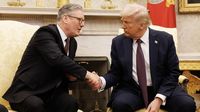As global economic uncertainty continues to mount, particularly due to recent tariffs announced by former President Donald Trump, the implications for the UK housing market are becoming increasingly significant. Stock markets worldwide have reacted with volatility, plunging and rallying amid concerns surrounding the tariffs and their potential impact on interest rates and housing affordability.
Experts are weighing in on how these tariffs could affect UK mortgages and private rents. According to reports, the Bank of England is considering cutting base interest rates, currently at 4.5%, three times this year, rather than the previously expected two cuts. This shift in policy aims to stimulate consumer spending, as higher interest rates typically encourage saving over spending.
Jonathan Bone, head of mortgages at the online broker Better.co.uk, emphasized the heightened economic uncertainty caused by Trump’s tariffs. He stated, “Over the past few years, the UK has experienced a lot of economic uncertainty, which we’ve seen impact mortgage holders, but now Trump’s tariffs have heightened that global economic uncertainty even further.” He further explained that the tariffs could prompt the Bank of England to lower interest rates to make borrowing cheaper for both businesses and consumers.
Falling swap rates—interest rates that lenders pay for fixed funding—have already led mortgage lenders to reduce their fixed-rate offerings. Bone noted, “We may even see these drop even further in the coming weeks.” For those remortgaging or seeking to enter the property market, this could present an opportunity to benefit from lower interest rates.
On the rental side, the picture is more complex. Renters in the UK are grappling with record-high rents, which have surged 8.1% to an average of £1,326 per month over the past year, according to the latest figures from the Office for National Statistics. The demand for private rented housing has outpaced supply, exacerbated by a decline in social housing over recent decades.
Ben Twomey, chief executive of Generation Rent, has voiced concerns about the potential for landlords to increase rents in response to economic pressures. He warned, “Everyone needs a safe affordable home. The fear for renters is there’s nothing stopping landlords with shares in the global market from clicking their fingers and recouping their losses through sudden rent rises.”
Bone elaborated on the challenges facing renters, describing the situation as a “perfect storm of rising rents and limited housing supply.” He cautioned that while lower interest rates may ease mortgage costs for landlords, rising costs and inflationary pressures, likely worsened by the tariffs, could drive many landlords out of the market.
In a related development, mortgage rates in the UK are poised to drop significantly as lenders respond to market pressures. On April 9, 2025, Coventry Building Society announced a reduction of its 2-year fixed rate to 3.89%, a move that brokers believe could trigger further declines across the market. Stephen Perkins, managing director at Yellow Brick Mortgages, remarked, “Coventry follows TSB and other lenders in finally passing on the recent swap rate reductions to borrowers, which should now apply market pressure to the big six lenders to follow suit, causing rates to fall like dominoes.”
Michelle Lawson, director at Lawson Financial, echoed this sentiment, stating, “Tariff wars may be playing out globally, but UK borrowers look like they will finally start getting some much-needed relief.”
The Bank of England’s main interest rate, currently at 4.5%, was initially projected to be reduced twice this year. However, the uncertainty surrounding US tariffs has shifted expectations to three cuts. As of April 10, 2025, other lenders, such as Santander and Nationwide, were offering 2-year fixed mortgages at rates of 4.05% and 4.34%, respectively, both accompanied by a £999 fee.
As the situation evolves, the Bank of England has issued updates regarding the potential consequences of growing global instability on domestic resilience. EJ Antoni has warned that the Bank should be concerned about the implications of gold exiting to the US, indicating a broader economic anxiety that could affect the housing market.
In summary, the interplay between Trump's tariffs, interest rates, and the housing market is creating a landscape of uncertainty for both mortgage holders and renters in the UK. With the Bank of England poised to cut interest rates, there may be some relief for borrowers, but the complexities of the rental market could lead to further challenges for tenants.






